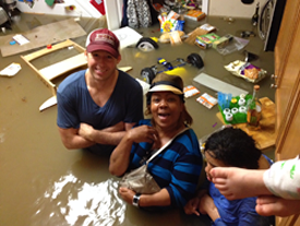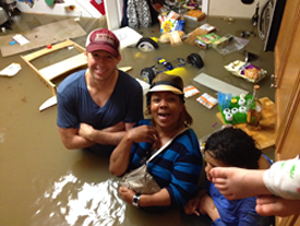On the eve of graduation, flooding and heroism


May 12, 2014
By Ron Hartung
Veteran Navy helicopter pilot Jimmy Westbrook has waited 16 years for this. Saturday is graduation day for the 115 members of the FSU College of Medicine’s Class of 2014 — including the 17 with whom he’s spent the past two years at the Pensacola Regional Campus.
But suddenly it’s not even certain whether he’ll be at graduation, because Pensacola’s recent storm turned his life upside-down.
The more compelling news is that one of his neighbors, in a wheelchair, might have drowned that night if not for Westbrook. Thanks to a boat’s timely arrival, both families lived to tell this soggy story.
“It happened so fast,” Westbrook, 35, said Friday. “We’re really glad that boat came when it did. We were running out of options.”
Said neighbor Clarissa Puryear, whose daughter uses a wheelchair: “We were terrified. Jimmy is our super-hero. He’s going to excel wherever he goes.”
Westbrook has been excelling since he first came to Pensacola, for Officer Candidate School, six days after he graduated from the University of Washington. He put his dream of becoming a doctor on hold, went to flight school and spent nine years flying helicopters for the Navy around the world.
Two years ago he returned, on a military scholarship, as a third-year med student. Pensacola is one of the College of Medicine’s six regional campuses. Its mission is to produce physicians who practice patient-centered health care and respond to community needs. Westbrook’s choice to pursue family medicine fits right in with that mission.
“Jimmy’s done very well as a medical student and was skillful in juggling the responsibility for his growing family with medical education,” said Paul McLeod, M.D., dean of the Pensacola campus. “He’s very well prepared to respond to an emergency with a clear head and no panic.”
Most people would have panicked during those three wild hours.
After midnight, early on May 1, the river of rainwater flowing down Harlington Street in Bristol Park suddenly invaded the single-story homes. Westbrook, wife Ashley, 3-year-old daughter Ellie, 9-month-old daughter Zoey and pet Pomeranian Bella all watched nervously as the water in their house continued to rise. While Mom kept finding higher places for the kids, eventually perching them atop the kitchen cabinets, Westbrook went next door.
Puryear, 53, lived there with daughters Venezia Jackson, who babysat for the Westbrooks, and Monique Jackson, who has cerebral palsy. Because the water pressure prevented Westbrook from opening the front door, he broke a window and climbed in. Then came the challenge of getting out, carrying Monique on his back.
Finally they made it back to the Westbrooks’ home, where he had to kick down the door. It seemed as if things had stabilized – until the water started rising higher, and the power went out. Now it was wet, dark and scarier than ever. But before long two people paddled by in their small boat. Westbrook flagged them down. There was room for his wife, his daughters and Puryear’s daughters.
He and Puryear stayed behind and waited. Finally, a kayak came. Puryear climbed in, and Westbrook walked alongside.
“I can’t even put into words what Jimmy did for us,” Puryear said. “He saved our lives. I know he has a special blessing coming. He didn’t have to do that.”
Westbrook credited his wife: “She was really cool and calm during the whole thing. That made all the difference.”
Now he and his family are in California. They were planning to move anyway, because Westbrook will continue his medical training in the Camp Pendleton family medicine residency program. They just hadn’t planned to be there this soon. But since their rental house and most of their possessions were ruined, they called the movers and said, “Come on out now.”
Westbrook has tickets to Tallahassee for graduation. He hopes he can attend, because he’s been so pleased with his training here. Students learn from community doctors.
“Being able to train one-on-one with physicians is pretty incredible,” he said. “Some of these people are legends in their field. I don’t just hear lectures from them. I get to eat lunch with them and really hear how they think.”
He also appreciates the similarities he’s discovered between his two careers.
“You fly as part of a crew, and it’s the same thing with doctors and nurses and residents,” he said. “You can’t do it by yourself, and those who try usually fail. It’s life-and-death, but it’s so much about communication, and getting ahead of the problem.
“Some surgical specialties are even starting to use a checklist. Aviation pioneered the checklist model. Now we’re seeing it in medicine, too. For me, it feels like home.”
Ultimately, he and his wife hope to settle down in Florida, perhaps in the Pensacola area. No doubt they’ll look for high ground.

